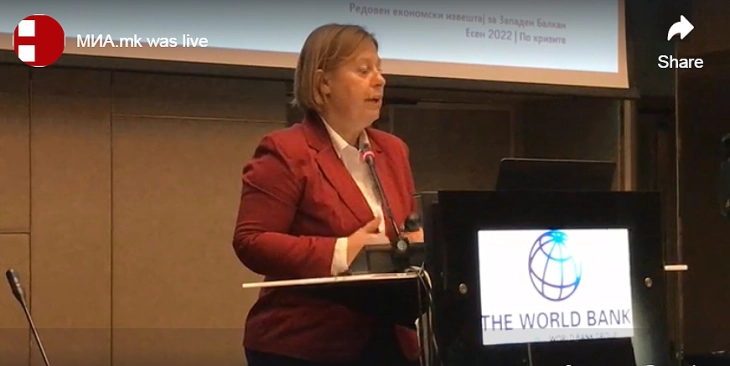World Bank report says North Macedonia needs policies that protect most vulnerable, focus to continue on long-delayed structural reforms to boost growth

Skopje, 24 October 2022 (MIA) – Affected by the war in Ukraine and the energy crisis, North Macedonia is facing the highest inflation so far, disproportionately reducing the real income of the poor, according to the latest World Bank’s Western Balkans Regular Report, which includes North Macedonia. With limited fiscal space, increased public debt and increased financing costs, according to the World Bank, fiscal support should be targeted at the most vulnerable households and companies.
At the same time, monetary policy tightening should strike a balance between suppressing inflation and avoiding a slowdown in economic activity.
“The Government's support for energy-vulnerable groups is an important step in the right direction, but measures should be targeted and time-limited to minimize fiscal risks,” Massimiliano Paolucci, World Bank Country Manager for North Macedonia and Kosovo said in a video address at Monday’s presentation in Skopje.
At the same time, according to Paolucci, focus should continue on long-delayed structural reforms to boost growth and create new jobs.
According to the report, such reforms include measures to increase the level of market competition, remove barriers to business entry, improve the retention of reinvestment by foreign investors, reduce barriers to female labor force participation, improve the quality of education and raise management standards, including digitization.
The current crisis also highlights the importance of an accelerated green transition in the region, away from volatile hydrocarbons towards cleaner electricity generation, as well as greener models of production and consumption, the report reads.
The latest Western Balkans Regular Economic Report notes that the economic situation in all six economies of the Western Balkans continues to be affected by the ongoing war in Ukraine and the sharp increase in energy prices, as well as the slowdown in global growth. These crises create strong challenges for the region, despite better-than-expected growth since the beginning of the year.
In the first half of 2022, economic growth led by private consumption and investment proved robust, exceeding expectations. Employment levels reached historic highs in several countries by mid-2022, while the region's employment rate now averages 46 percent, which is an increase of three percentage points compared to mid-2021. However, according to the World Bank, growth momentum is now beginning to slow down in the face of mounting challenges. Higher energy and food prices have pushed inflation to levels not seen in years, reducing purchasing power and business confidence. The labor market recovery has begun to slow with weaker employment amid high inflation and increased uncertainty.
Sanja Madzarevic-Sujster, Senior Economist for the Western Balkan countries and Country Economist for North Macedonia, who authored the report, told Monday’s presentation in Skopje that the combination of shocks is weighing heavily on the region's outlook.
“The current global financing conditions, the slowdown of both domestic and external demand, as well as the decrease in the trust of companies and consumers will certainly affect the financial sector in the region,” Madzarevic-Sujster said.







